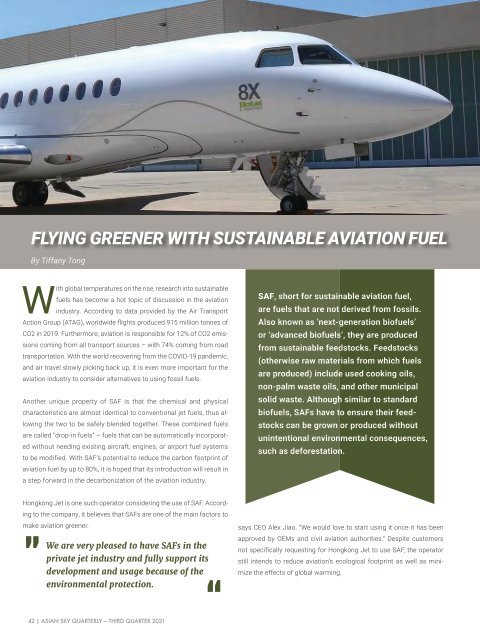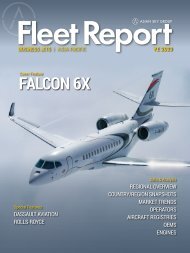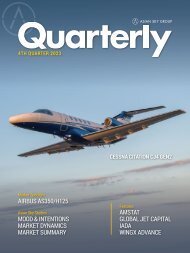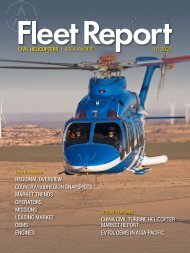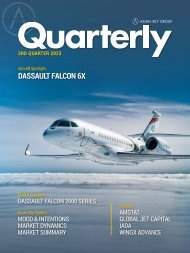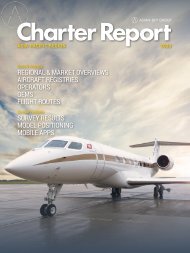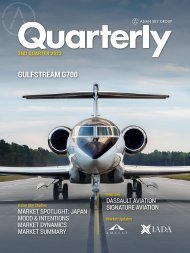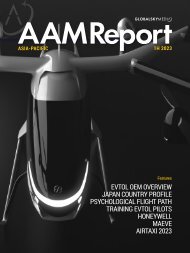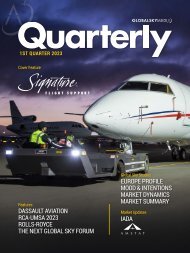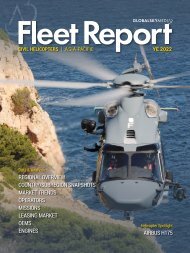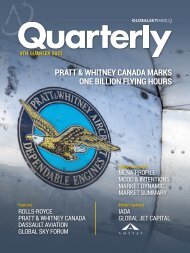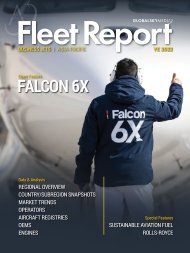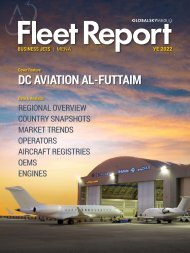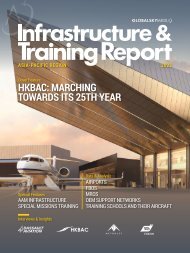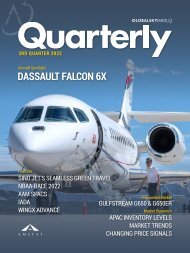Asian Sky Quarterly 2021 Q3
You also want an ePaper? Increase the reach of your titles
YUMPU automatically turns print PDFs into web optimized ePapers that Google loves.
FLYING GREENER WITH SUSTAINABLE AVIATION FUEL<br />
By Tiffany Tong<br />
With global temperatures on the rise, research into sustainable<br />
fuels has become a hot topic of discussion in the aviation<br />
industry. According to data provided by the Air Transport<br />
Action Group (ATAG), worldwide flights produced 915 million tonnes of<br />
CO2 in 2019. Furthermore, aviation is responsible for 12% of CO2 emissions<br />
coming from all transport sources – with 74% coming from road<br />
transportation. With the world recovering from the COVID-19 pandemic,<br />
and air travel slowly picking back up, it is even more important for the<br />
aviation industry to consider alternatives to using fossil fuels.<br />
Another unique property of SAF is that the chemical and physical<br />
characteristics are almost identical to conventional jet fuels, thus allowing<br />
the two to be safely blended together. These combined fuels<br />
are called “drop-in fuels” – fuels that can be automatically incorporated<br />
without needing existing aircraft, engines, or airport fuel systems<br />
to be modified. With SAF’s potential to reduce the carbon footprint of<br />
aviation fuel by up to 80%, it is hoped that its introduction will result in<br />
a step forward in the decarbonization of the aviation industry.<br />
SAF, short for sustainable aviation fuel,<br />
are fuels that are not derived from fossils.<br />
Also known as ‘next-generation biofuels’<br />
or ‘advanced biofuels’, they are produced<br />
from sustainable feedstocks. Feedstocks<br />
(otherwise raw materials from which fuels<br />
are produced) include used cooking oils,<br />
non-palm waste oils, and other municipal<br />
solid waste. Although similar to standard<br />
biofuels, SAFs have to ensure their feedstocks<br />
can be grown or produced without<br />
unintentional environmental consequences,<br />
such as deforestation.<br />
Hongkong Jet is one such operator considering the use of SAF. According<br />
to the company, it believes that SAFs are one of the main factors to<br />
make aviation greener.<br />
We are very pleased to have SAFs in the<br />
private jet industry and fully support its<br />
development and usage because of the<br />
environmental protection.<br />
says CEO Alex Jiao. “We would love to start using it once it has been<br />
approved by OEMs and civil aviation authorities.” Despite customers<br />
not specifically requesting for Hongkong Jet to use SAF, the operator<br />
still intends to reduce aviation’s ecological footprint as well as minimize<br />
the effects of global warming.<br />
42 | ASIAN SKY QUARTERLY — THIRD QUARTER <strong>2021</strong>


